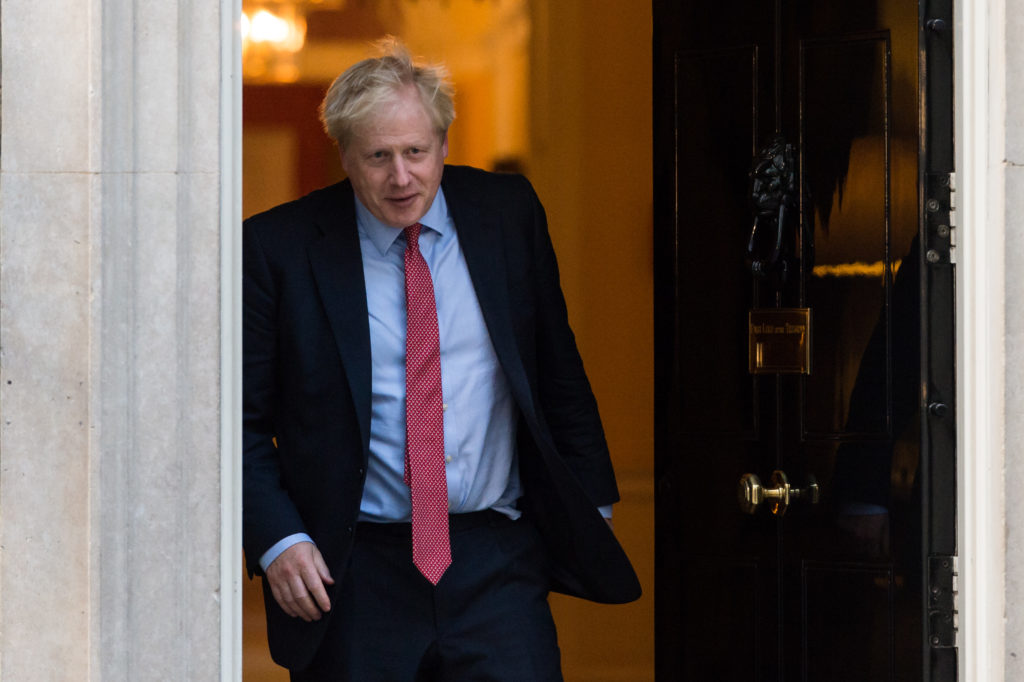Boris Johnson steps out of 10 Downing Street, October 2019. (WIktor Szymanowicz/NurPhoto via Getty Images)
The UK prime minister Boris Johnson will tomorrow (October 14) unveil voter ID proposals to make showing photo ID compulsory in order to vote.
The controversial voter ID plans, part of a raft of new measures expected to be announced in a Queens Speech, are supposedly an attempt to tackle electoral fraud but critics say they will disenfranchise minority groups like the trans community.
“I don’t have photographic ID,” said Tara Hewitt, a trans woman, on Twitter. “Trans people have to go through more steps and find it increasingly difficult to get photo ID in [the] UK, needing letters from doctors and often sending forms backwards and forwards.”
“This is an attack on our democracy and will take away the franchise from so many,” Hewitt added.
Another Twitter user said, “I know we’re not the target here. But voter ID also disenfranchises trans/NB [non-binary] people whose ID may not match their lived gender. The fear of being turned away or just publicly humiliated could deter some from voting.”
This 👇 plus from the LGBT+ perspective, it can already be difficult for trans people to obtain a valid photo ID and you can foresee potential misgendering when attempting to vote. There aren’t any examples of recent mass voter fraud in the UK despite MANY elections so why now? https://t.co/ztUBiUTc3t
— Mark Whiley (@markwhiley) October 13, 2019
Hackney MP Diane Abbott called the plans “straightforward voter suppression on the model of the American right”.
Responding to Abbott, another Twitter user asked, “Can you ask then what alternatives there are for Trans people, people in rural areas and Muslim women who may have to show their faces, so privacy needed. This has been raised before about voter ID.”
Voter ID laws are voter suppression laws. They unevenly prevent people from low income backgrounds from voting, particularly people of colour. The address difficulty for trans folk to access correct ID is also incredibly concerning. https://t.co/GfEG5XOBuq
— 🌒🌔 Ashathoth, The Inflationary Chaos 🌖🌘 (@DrAshleyNova) October 13, 2019
Voter ID trials were held in 10 local authority areas during local elections in May 2019.
The Electoral Commission’s evaluation of those trials found that some groups of people found it harder than others to provide photo ID, including people with protected characteristics such as gender reassignment.
Example from the USA…. all UK peeps that think voter ID is no big deal to trans and non binary people. This is a massive issue for minority communities in the UK we need to push back hard against. https://t.co/6vo0LXT7Gb
— Tara Hewitt – Girly Swot 🏳️🌈🦡⛤🖖 (@Tara_Hewitt) October 13, 2019
Research in 2015 found that 3.5 million Brits – or 7.5 percent of the voting population – do not have access to photo ID.
In the 2017 general election, there was just one conviction for voter fraud out of a total of 32 million votes.
In the US, tens of thousands of trans people lost their ability to vote when stricter voter ID laws were brought in.
